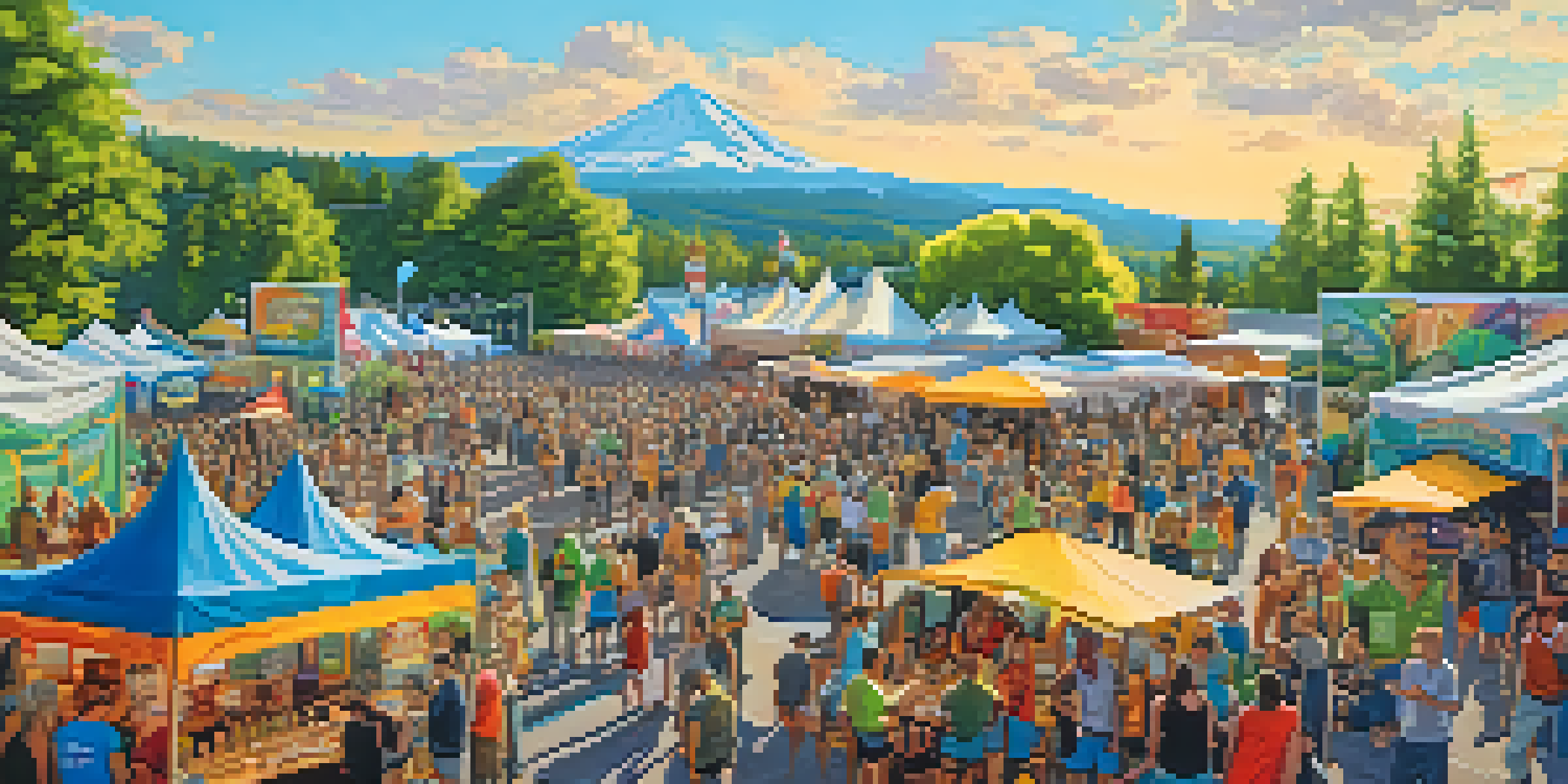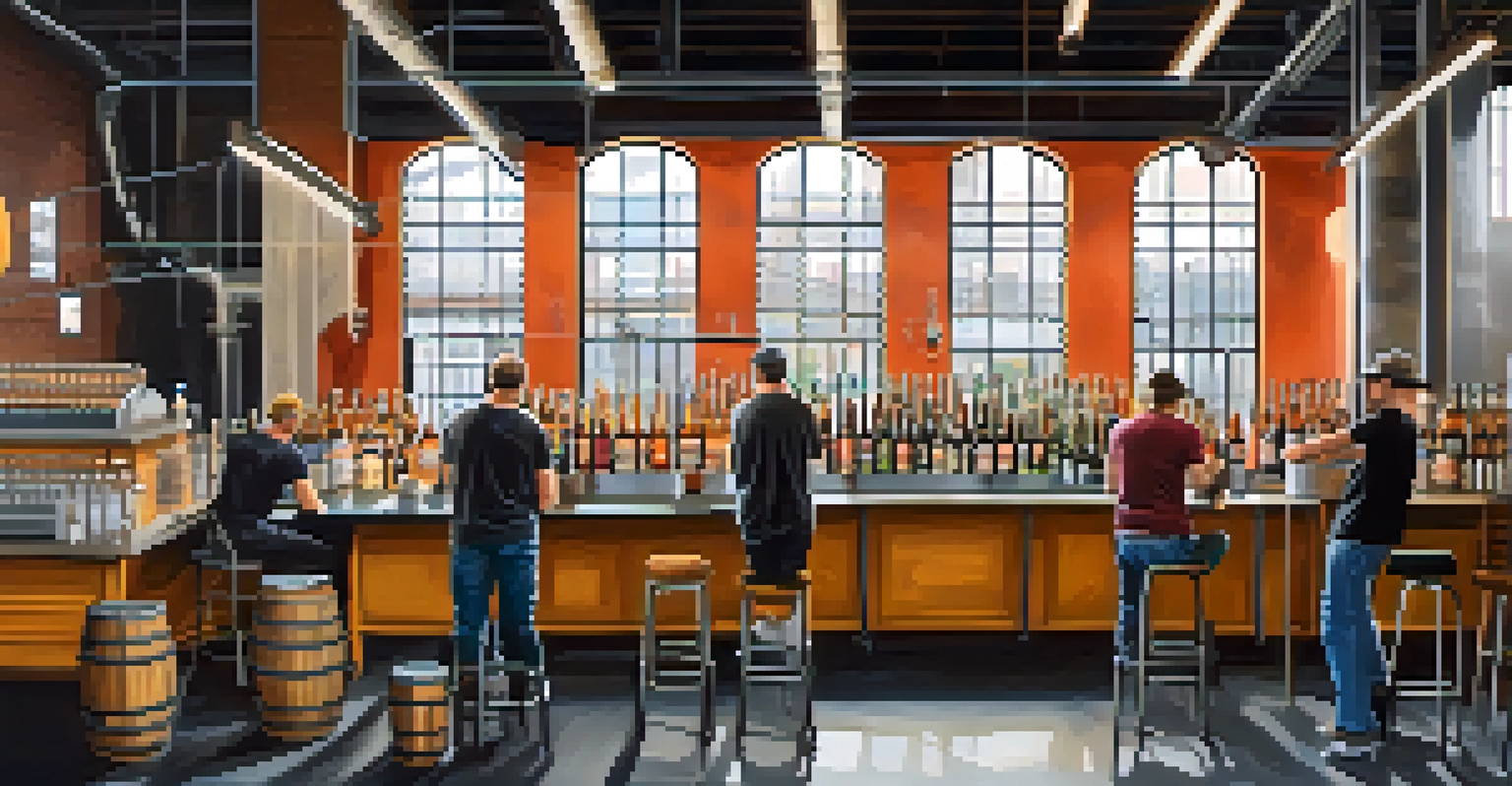The Rise of Craft Breweries in Portland: A Historical Overview

The Origins of Craft Beer in Portland
Portland's craft beer scene has roots that stretch back to the late 1970s. During this time, the craft beer movement began to take shape across the United States, with brewers experimenting with flavors and techniques. The first significant step in Portland’s craft beer history came in 1985 with the opening of BridgePort Brewing Company, which laid the groundwork for future breweries.
Beer, if drunk in moderation, promotes health and longevity.
As the craft beer movement gained momentum, Portland quickly became a fertile ground for innovation and creativity in brewing. The city's unique geography and climate provided the perfect setting for brewing high-quality beers. Additionally, the local community's growing appetite for diverse flavors encouraged many aspiring brewers to take the plunge into craft brewing.
By the early 1990s, the craft beer landscape in Portland began to flourish, with more breweries joining the scene. This era marked the beginning of a vibrant culture where local ingredients and artisanal methods were celebrated, setting the stage for what would become one of the most recognized craft beer hubs in the country.
The Impact of the 1990s Craft Beer Boom
The 1990s witnessed a massive boom in the craft beer industry, and Portland was right at the forefront. With a surge of new breweries opening, the city's beer scene transformed into a diverse tapestry of flavors and styles. Breweries like Deschutes and Widmer Brothers began to gain national recognition, showcasing the quality of beers being produced in Portland.

During this decade, beer festivals became popular, providing a platform for local breweries to share their creations with the community. Events like the Oregon Brewers Festival helped to solidify Portland's reputation as a craft beer destination and attracted enthusiasts from all over the country. These festivals not only celebrated local brews but also fostered a sense of camaraderie among brewers.
Portland's Craft Beer Roots
Portland's craft beer scene began in the late 1970s and blossomed with the establishment of BridgePort Brewing Company in 1985, paving the way for innovation.
As the 1990s progressed, the city’s craft breweries began to innovate further, experimenting with ingredients and brewing techniques. This era was marked by a push towards sustainability, with many breweries sourcing local ingredients, which resonated with the health-conscious and environmentally aware Portland population.
The Influence of Local Culture on Brewing
Portland's craft beer scene is deeply intertwined with the city’s culture and values. The emphasis on sustainability, creativity, and community engagement has shaped the way breweries operate. Many craft brewers prioritize using organic and locally sourced ingredients, reflecting the city's eco-friendly mindset.
Craft beer is a reflection of the community it comes from.
Moreover, the artistic spirit of Portland plays a significant role in its craft beer identity. Breweries often collaborate with local artists to create unique labels, host art shows in their taprooms, and even brew beers inspired by local art. This fusion of creativity extends beyond the brewing process, creating a multi-dimensional experience for beer enthusiasts.
Community involvement is another cornerstone of Portland's brewing culture. Many breweries engage in local charity events, support local farmers, and even host workshops to educate the public about brewing. This sense of community not only enriches the beer culture but also fosters a loyal customer base that appreciates the local touch.
The Advent of Microbreweries and Nanobreweries
As the craft beer movement continued to evolve, the rise of microbreweries and nanobreweries emerged as a game-changer in Portland. These smaller operations allowed for an even greater level of experimentation and innovation, as brewers could produce limited batches of unique creations. This new wave of brewing offered enthusiasts a chance to taste something truly special and different.
Microbreweries often focus on niche markets, catering to specific tastes or styles that larger breweries may overlook. This has led to a rich variety of beers, from barrel-aged stouts to sour ales, that keep the local beer scene exciting and ever-changing. Portland's reputation as a craft beer haven was further solidified as these smaller breweries contributed to the diversity of offerings.
Impact of Festivals on Community
Beer festivals in Portland, like the Oregon Brewers Festival, foster community spirit and showcase local breweries, enhancing appreciation for craft beer.
Nanobreweries, even smaller than microbreweries, took this concept to the next level. Many operate out of homes or small spaces, allowing passionate hobbyists to share their brews with the community. This grassroots approach has fostered a sense of connection between brewers and consumers, creating a tight-knit community of beer lovers who appreciate the artistry behind each pint.
The Role of Beer Festivals in Portland
Beer festivals have become a staple of Portland's craft beer culture, celebrating the creativity and diversity of local breweries. Events like the Oregon Brewers Festival and Portland Craft Beer Festival draw thousands of attendees each year, eager to sample the latest creations from their favorite local brewers. These festivals not only showcase the best of Portland’s brewing scene but also promote camaraderie among beer lovers.
At these festivals, attendees can explore a wide array of styles and flavors, often meeting the brewers behind the beers they enjoy. This direct interaction fosters a deeper appreciation for the craft and encourages consumers to support their local breweries. The festivals also serve as a platform for brewers to experiment with unique ingredients and styles, keeping the local scene vibrant and innovative.
Moreover, beer festivals often highlight the importance of community and collaboration in the craft beer industry. Many breweries come together to create special collaboration brews for these events, showcasing the spirit of teamwork that defines Portland's brewing culture. This sense of unity is a testament to the city's commitment to craft beer and its dedication to supporting local businesses.
The Challenges Facing Craft Breweries Today
Despite the success of Portland's craft breweries, they face challenges in an increasingly competitive market. With the craft beer industry experiencing rapid growth, saturation has become a concern for many brewers. New breweries are opening regularly, making it essential for established ones to continually innovate and differentiate themselves to maintain their customer base.
In addition to market saturation, rising costs of ingredients and labor pose significant challenges. Many breweries are grappling with the impact of inflation and supply chain disruptions, which can affect their bottom line. This economic landscape requires brewers to be strategic in their operations while still delivering high-quality products.
Challenges and Future of Breweries
Despite the success of craft breweries, challenges such as market saturation and evolving consumer preferences necessitate adaptability for future growth.
Furthermore, as consumer preferences shift towards other alcoholic beverages like hard seltzers and cocktails, craft breweries must adapt to stay relevant. Many are diversifying their offerings to include new styles and flavors, ensuring they capture the attention of a broader audience. This adaptability is crucial for the future of Portland's craft beer scene.
The Future of Craft Breweries in Portland
Looking ahead, the future of Portland's craft breweries is promising yet requires adaptability. As the industry continues to evolve, brewers are exploring new trends, such as incorporating non-traditional ingredients and focusing on sustainability. This commitment to innovation will be vital for attracting new customers and retaining loyal ones.
Additionally, with the growing emphasis on health and wellness, breweries are beginning to experiment with low-alcohol and non-alcoholic options. This shift reflects changing consumer preferences and opens up new avenues for growth within the market. By catering to diverse tastes, Portland's breweries can ensure their continued relevance in an ever-changing landscape.

Lastly, collaboration will remain a key theme in the future of Portland's craft beer scene. As breweries continue to work together on special projects and events, they will not only strengthen their community ties but also create unique experiences for beer lovers. This spirit of collaboration is what has made Portland a beacon for craft beer enthusiasts and will undoubtedly shape its future.